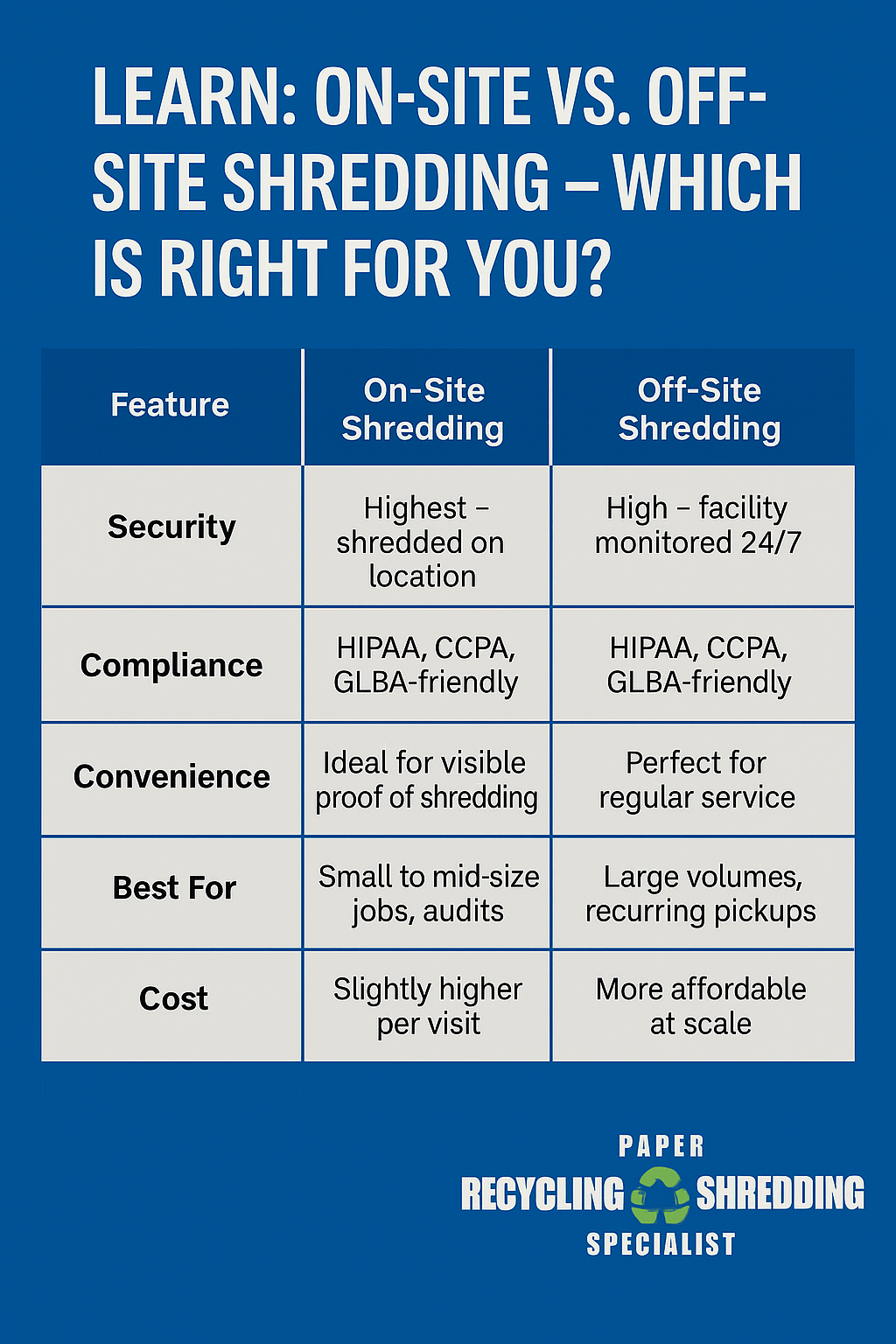Learn: On-Site vs. Off-Site Shredding – Which Is Right for You?
If you’re responsible for managing sensitive documents—whether you’re in healthcare, finance, education, or any office that handles personal data—secure shredding isn’t optional. But choosing the right type of service can feel overwhelming, especially when you’re comparing on-site shredding vs. off-site shredding.
So which is better for your business? Let’s break it down in plain terms, based on what we’ve seen work for real companies across Southern California.
What Is On-Site Shredding?
With on-site shredding (also called mobile shredding), a truck equipped with an industrial shredder comes directly to your location. Your documents are loaded into secure bins and destroyed on the spot, before the truck even leaves your parking lot.
Best for:
Businesses that want to witness destruction firsthand
Companies in regulated industries like healthcare or law
Organizations that value a strong chain of custody
Teams with modest volumes of shredding or occasional purges
What Is Off-Site Shredding?
With off-site shredding, your documents are picked up and securely transported to a shredding facility. There, they’re processed in bulk using high-speed shredders under video surveillance.
Best for:
Businesses with large volumes of paper
Companies with multiple departments or locations
Teams looking for a cost-effective, high-capacity solution
Recurring service customers who want scheduled pickups
Security: What’s Safer?
Both options can be safe if done correctly—but here’s the key:
On-site shredding offers immediate destruction. There’s no transport risk, and many clients feel more comfortable knowing their materials are shredded right in front of them.
Off-site shredding still offers tight controls, including GPS-tracked transport, locked bins, and Certificates of Destruction, especially when working with a NAID AAA Certified provider.
If you require a chain of custody for HIPAA or CCPA compliance, on-site may be preferred. But reputable off-site providers (like us) maintain detailed audit trails and secure, certified processing.
Cost Considerations
Generally speaking, off-site shredding is more affordable—especially for high-volume needs. The equipment used at centralized facilities can shred massive quantities quickly, lowering labor and equipment costs.
On-site shredding may cost a bit more per visit, but for clients who value control, speed, and one-time purges, it’s often worth it.
Convenience and Scheduling
Off-site is ideal if you want routine service without interruption. Just load the bin and forget about it.
On-site gives you flexibility and peace of mind, especially if you want to be present during destruction.
Ask yourself:
Do I want to see the shredding happen?
Do I need a shredding partner to handle large backlogs?
What’s more important: speed or scale?
Serving All of Southern California
At Paper Recycling & Shredding Specialist, we offer both on-site and off-site shredding options to businesses throughout:
We’ll help you find the option that fits your security needs, workflow, and budget.
Quick Comparison: On-Site vs. Off-Site Shredding
| Feature | On-Site Shredding | Off-Site Shredding |
|---|---|---|
| Security | Highest – shredded on location | High – facility monitored 24/7 |
| Compliance | HIPAA, CCPA, GLBA-friendly | HIPAA, CCPA, GLBA-friendly |
| Convenience | Ideal for visible proof of shredding | Perfect for regular service |
| Best For | Small to mid-size jobs, audits | Large volumes, recurring pickups |
| Cost | Slightly higher per visit | More affordable at scale |
Final Thoughts
There’s no one-size-fits-all solution—and that’s a good thing. Your shredding service should match your business’s size, risk tolerance, and regulatory requirements.
If you’re not sure which direction to go, we’re happy to walk you through your options—no pressure, just straight answers.
💬 Want Help Choosing the Right Shredding Service?
Let’s find the best fit for your needs and your peace of mind.

